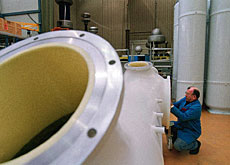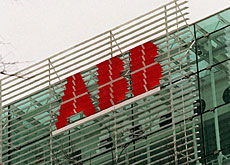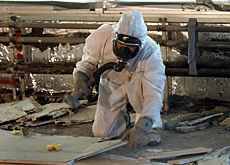Asbestos ruling clears the air for ABB
A United States federal judge has approved a $1.43-billion deal (SFr1.88 billion) that settles long-running asbestos litigation against the ABB engineering group.
The decision gives the green light for ABB’s revised restructuring plan of its US Combustion Engineering subsidiary.
And it means that ABB, which is based in Zurich, can now concentrate on developing its core business of power and automation technologies.
Claimants still have 30 days to lodge objections to the decision, but the vast majority have already signalled their acceptance of the cash and shares offer.
Tuesday’s ruling by a federal judge in a New Jersey court also does not affect separate, but smaller, litigation against ABB’s Lummus Global division.
The Swiss-Swedish company bought Combustion Engineering, a US firm that had in the 1970s produced asbestos-lined boilers, in 1990 despite pending lawsuits from former workers.
ABB was soon swamped by an avalanche of litigation soaring to more than 100,000 claims which brought the company to the brink of bankruptcy in 2002.
Major restructuring
A change of leadership followed by major restructuring has now revived ABB’s fortunes.
Bank Sarasin analyst Andreas Riedel believes the positive outcome in the US district court will enable managers to get on with the job of continuing the turnaround.
“The asbestos issue has absorbed a lot of management capacity which can now be channelled into more profitable areas,” he told swissinfo.
“The non-core business [including Combustion Engineering and Lummus], which is still included in the operating profit, dragged the company’s operating profit (Ebit) margin down to 2.4 per cent in 2005.
“They are now able to divest these groups and concentrate on the core activities in the automation and power markets with the aim of meeting their Ebit target of ten per cent by 2009.”
Expected upgrade
Another benefit of the settlement is the expected upgrade of ABB shares from junk to buy status, according to Riedel.
“This would help their credit rating and help them find new investors. Some funds are not allowed to invest in junk-rated companies, so this would also be good news.
“People are realising that ABB are really on track to reaching their targets.”
The protracted legal wrangling cost ABB dearly in terms of both time and money. The company revealed earlier this month that the total bill for asbestos litigation, including legal fees, would probably top $2 billion.
It also had to revise a reported $201-million profit in 2004 into a $35-million loss, after a US court threw out a proposed compensation deal that forced the firm to up its offer by $232 million to asbestos claimants.
Bitter blow
That ruling in December 2004 was a bitter blow to ABB after close to 100 per cent of claimants had accepted the package. The asbestos saga then dragged through various courts for another year until Tuesday’s ruling.
Litigation still hangs over ABB’s Lummus Global division that also made products that contained the cancer-inducing material.
But the number of claims against Lummus represents a fraction of the total litigation, and ABB expects this case to be resolved in the near future.
One glimmer of a silver lining has been the upturn in fortunes for Lummus, which has continued to produce infrastructure for the now booming power industry.
Lummus profit
ABB was unable to sell Lummus while it was shrouded in litigation, and the division is now turning in a profit.
But ABB chief executive Fred Kindle told swissinfo at the company’s annual results meeting that it was unlikely that Lummus would be retained as a core business, despite its recent record.
“It would be rather opportunistic to reclassify it as core, and our long-term strategy requires clarity. The fact that it is now profitable means that if we sold it at some point there is more value in the sale than before,” he said.
Last year ABB recorded a profit for the first time since 2000 with a net income of $735 million (SFr963 million), compared with a loss of $35 million the previous year.
swissinfo, Matthew Allen in Zurich
ABB was created in 1988 after the fusion of the Swedish ASEA and the Swiss BBC Brown Boveri.
The company nearly collapsed under a mountain of debts in 2002 following over-rapid expansion and spiralling asbestos claims. Jürgen Dormann, who is credited with turning the company around, took over as chairman of the company in 2002.
Fred Kindle became chief executive last year and the company posted profits in 2005 for the first time in five years.
In 1990 ABB bought US firm Combustion Engineering, that had produced boilers lined with asbestos in the 1970s, despite the fact that Combustion was already facing limited asbestos litigation.
Lawsuits skyrocketed in the mid-1990s and in February 2003 Combustion filed for bankruptcy protection since its asbestos liability was expected to exceed the company’s book assets of $812 million.
ABB proposed a $1.2 billion trust fund to cover future claims, including cash and shares, but this was rejected by a court in December 2004 because of the inclusion of Lummus Global in the package.
ABB increased its offer by $232 million the following March, which wiped out profits posted in 2004. On February 28 a US district court in New Jersey finally approved the settlement pending a 30-day period when objections can be submitted.

In compliance with the JTI standards
More: SWI swissinfo.ch certified by the Journalism Trust Initiative




You can find an overview of ongoing debates with our journalists here. Please join us!
If you want to start a conversation about a topic raised in this article or want to report factual errors, email us at english@swissinfo.ch.